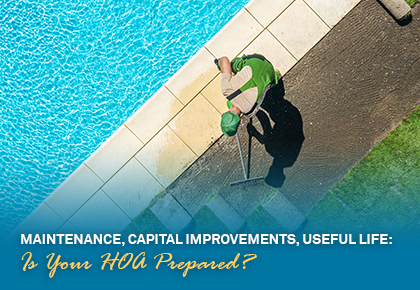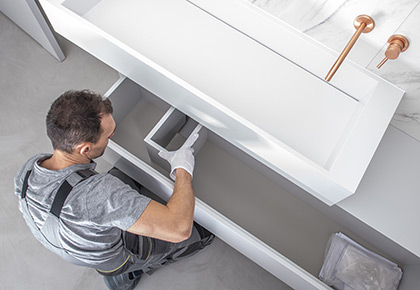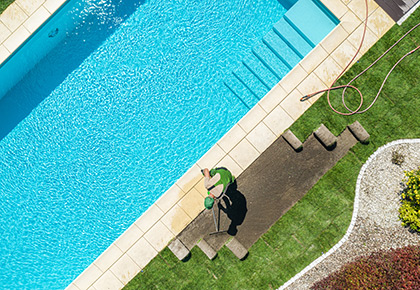-
Creating a New HOA Policy Without Making Enemies
Whether you are addressing overnight guest parking, or approved flooring, the basic process for creating good policies and enforcing them successfully are the same. Consider these eight steps when establishing an HOA policy. -
Electronic Voting in Arizona - What You Should Know
These days, you can do almost anything online—buy groceries, look for a job or even find love. But what about voting on issues that affect your community? -
5 Surprising Reasons to Raise Your HOA Assessments
If your main concern is to avoid increasing assessments, you may want to reconsider. As a board member, one of your primary fiduciary responsibilities is to protect property values, and assessments are an investment that helps do just that. -
HOA Committees and Volunteers: 8 Rules to Rally Residents
A healthy and effective Arizona homeowners association is not only able to identify great volunteers and committee members, but will empower them to drive positive change in the community. But how do you get there? -

Maintenance, Capital Improvements, Useful Life: Is Your HOA Prepared?
Not sure which components you should fix and which you should replace entirely? You're not alone. Get the answers to some of your top questions about maintenance, capital improvements, and useful life. -

Reserve Funds, Assessment, or Loan: 3 Ways to Pay for a Capital Improvement Fee
Great capital improvements lead to better property values. Read on to see the three ways to pay for them and the pros and cons for each. -
The Facts about Synthetic Turf
Considering synthetic turf for your community common areas? Understanding the facts on what it's made of, benefits and disadvantages, and how it will affect children or pets will make all the difference when determining if synthetic turf is the right choice for your community! -
3 Strategies to Keep HOA Assessments Stable and Add Value
There are often valid reasons to raise assessments, but in some cases, you may want to take a different route. Here are three cost-saving strategies. -

React, Outsource, or Prevent? Find Your Association’s Maintenance Style
How does your Arizona association handle maintenance? Discover your association's unique maintenance style. -
An Ounce of Prevention
Like changing the oil in your car, regular maintenance on a building helps keeps everything working properly and safely. For stratas, some tasks are not optional, they are mandatory. -
Getting Your Strata’s Spring Cleaning Started
As strata managers begin their inspection, they note the necessary repairs for winter damage as they make their rounds through the community. -
How to Communicate: What Your Strata Council Should Know and Do
You want your strata to be successful. All council members do. You know that means watching the finances carefully and maintaining the property. But do you think about effective strata council communication as an ingredient in your recipe for success? It is! -
Smart Financial Planning
Safeguarding a strata corporation’s operating and reserve funds is one of the main fiduciary duties of all board members, not just the treasurer. This means strata councils must protect the financial interests of the strata corporation and its members. -
What Should you Expect from a Strata Manager
Not all strata managers have what they need to give you great service. Learn what it takes to be a great strata manager. -
Bidding Process Simplification Tips for HOAs in California
Some community associations simply get three proposals and price quotes, and go with the lowest bidder. That sounds easy, but buyer beware – there is much more to the bidding process than many board members realize. Sometimes simply choosing a vendor by its low price will get you exactly what you pay for. Here are some best practices on simplifying the bidding process and maximizing the value your association receives. -

React, Outsource, or Prevent? Find Your Association’s Maintenance Style
How does your California association handle maintenance? Discover your association's unique maintenance style. -
Five Ways Your HOA Should Tackle Water Conservation
Water conservation is on the minds of all California homeowners. As summer is quickly approaching, homeowner association (HOA) leaders throughout California need to be proactive in making the necessary changes within their communities. -

HOA Maintenance Responsibilities, Capital Improvements, and Useful Life: Is Your HOA Prepared?
Is your maintenance job turning into a capital improvement? Are you ready for a big capital improvement expenditure? Read on to get answers to your top questions about maintenance, capital improvements and useful life. -
8 Tips for Great HOA Committees and Volunteers
A healthy and effective California homeowners association will not only find great volunteers and committee members, but will empower them to drive positive change in the community. How can your association make this happen? -
Reserve Funds, Assessment or Loan: 3 Ways to Pay for Capital Improvements
Strategic capital improvements lead to better property values. Read on to see the three ways to pay for them and their pros and cons. -
The Four Fundamentals of Effective Community Landscaping
Landscaping makes an immediate statement about the brand of your community. The right landscaping can set your community apart from others and enhance property values. Here our four landscaping considerations. -

3 Strategies to Keep HOA Assessments Stable and Add Value
There are often good reasons to raise assessments, but in some cases, you may be able to take a different route. Here are three strategies to help save your HOA money and keep assessments stable. -
Tips for Eco-Friendly High-Rise Living
Eco friendly high-rise initiatives are not only good for the environment, but can be green for your association budget. How does close to $50,000 in annual savings sound? Here are suggestions you can implement for little to no cost. -
Five ways to improve board member communication in your HOA
How well your board communicates has a tremendous impact on your community association. Great communication can lead to better relationships with residents – both homeowners and renters – and helps build a stronger sense of community.